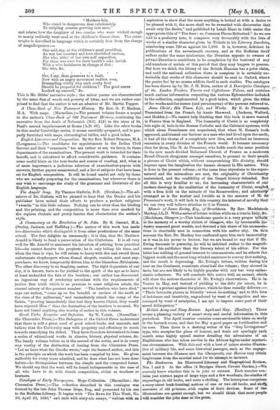to the memory of a worthy citizen of Glasgow, who
by honourable _ dustry amassed great wealth, and devoted a fair share of his ace-amnia., tions to charitable uses in connection with his native city.. On this account the Rev. Dr. Mackay has conferred upon him such immortality as it was in. his power to bestow, but we are bound to say that if Mr. Ewing descends to posterity, he will be indebted rather to the magnifil.- mice of his publisher than the literary talent of his editor. For the latter has nothing of general interest to communicate, and he selects the biggest words and the most long-winded sentences to convey that nothing, and the result is depressing. Mr. Ewing's letters, written during his tour on the Continent, constitute about half the volume; they abound in facts, but are not likely to be highly popular with any but very enthu- siaistic collectors. We will conclude this notice with an extract, which will show the serious character of Mr. Ewing's observations. He is in, Venice in May, and instead of yielding to the dolce- far niente, he is moved to a protest against the-phrase, which he thus roundly delivers :— "Their favourite phrase is literally 'sweet do-nothing,' and to this love of indolence and inactivity, engendered by want of occupation and en- couraged by want of enterprise, I am apt to impute some part of their- moral delinquency."






























 Previous page
Previous page